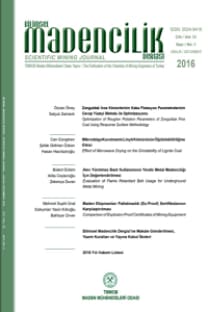Cevher Hazırlama ve Proses Metalurjisi ile İlgili Anılar 1. BÖLÜM Oksit Cevherlerin Flotasyonu
1930 yılından önce, Katanga'da (Belçika Kongo'sunda) oksitli bakır cevherlerinin
yağ asitleri ile flotasyonu yapıldı. Çeşitli yağ karışımlarının rolü, suyun sertliği ve magnezyum
iyonunun seçimliliği gibi problemler üzerinde çalışıldı.
Katanga'da 1930'da torbernit'in (bakır uranyum fosfat) yağ asitleri ile Rotasyonunda,
yağmurlu mevsimdeki düşük seçimliliğin nedeninin su sertliğindeki değişme olduğu anlaşılmıştır. Laboratuvar örneğinde olmadığı halde, ana cevherde olduğu anlaşılan
dolomit nedeniyle, kurşun ve çinko karbonat ayırımı başarısızlıkla sonuçlanmıştır.
1950-1960 yıllarında Sardunya ve Fas'ta okside kurşun cevherinin sülfürleştirme ile
flotasyonu uygulamaya konmuş ve sülfürleştirme tepkimesinden elde edilen kötü sonuçlar
nedeniyle bu tepkimenin dinamik karakteri araştırılmış, teorisi ortaya konmuştur. Reaktif miktarında azalma sağlamak için kuvvetli havalandırma ve hızlı flotasyonun
gerekliliği ortaya konmuş, laboratuvar ve tesiste elde edilen sonuçların karşılaştırılması yapılmış, yeni ve etkili bir flotasyon makinası geliştirilmiştir. 1939'da Liege
ve Paris'te oksitli çinko cevherlerinin aminlerle flotasyonu çalışmaları sürmekte idi.
Sardunya ve Fas'ta geliştirilen endüstriyel yöntem 1950'den itibaren bir çok ülkede
geniş çapta uygulanmaya başlanmıştır.
Metalik olmayan minerallerden temiz konsantre elde etmenin zorlukları belirtilmiş
tir. Bu yazı 1930'larda şimdi Zaire olan Belçika Kongo'sunda, daha sonra Belçika'da
Liege Üniversitesi'nde ve nihayet 25 yıl boyunca Paris'te Minerais et Métaux ve Société
de Penarroya'nın ortak laboratuvarında yapılan cevher hazırlama araştırmaları ile ilgili olacaktır. Kariyeri boyunca bir çok değişik cevher üzerinde çalışması nedeniyle, yazar,
gravite, manyetik ayırma ve diğer yöntemlerle ilgili problemlerle de ilgilenmiştir. Ancak
burada kendisi için daima özel ilgi alanı olan flotasyonu işlemekle yetinecektir.
Yazara gri renkte kirli bir pülpten, hassas reaktif ayarları sonucu enfes renkte bir köpüğün oluşması mucize gibi görülmektedir.
Okside cevherler yazarın ana araştırma konuları olmuştur. Onun için bu yazıda
okside cevherler konusu işlenmiştir.
Memoirs of Milling and Process Metallurgy Flotation of Oxidized Ores
The fatty acid flotation of oxidized copper ores was carried out in Katanga, Belgian
Congo, before 1930. Problems studied included the role of the various constituents of
the oil mixture, hardness of the water and the importance of the magnesium ion for
selectivity.
In the fatty-acid flotation of torbernite —the copper— uranium phosphate — it was
found in Katanga in 1930 that the poor selectivity was due to enhanced softness of the
water during the rainy season. Failure of the lead and copper carbonate separation process
in a fatty-acid float was due to the presence of dolomite, which was absent from
laboratory samples.
Sulphidization flotation of oxidized lead ores was performed in Sardinia and Morocco
around 1950-60, and the poor results of the sulphidization reaction and its
dynamic character were studied; the theory is outlined. It was found that strong aeration
and rapid flotation were necessary for economy in the use of the reagents; performance
in the mill and the laboratory were compared. An effective new flotation machine
was developed.
In 1939 research was in progress in Liege and Paris on amine flotation of oxidized
zinc ores. The process was developed industrially in Sardinia and Morocco from 1950,
and has been used on a large scale in various countries.
The difficulty of obtaining clean concentrates of non-metallic minerals is described.
The paper is concerned with milling research carried out in the Belgian Congo,
now Zaire, around 1930, later in Belgium at the University of Liege and finally during
25 years in the joint laboratory of Minerais et Métaux and Société de Penarroya in
Paris. Having worked on many different ores during his career, the author has studied
problems associated with gravity, magnetic separation and other processes; but he
restricts himself here to the topic of flotation, because this has always had a special
appeal for him. It seems a miracle that, after the delicate adjustment of reagents, a
beautiful coloured froth can be made to emerge from a grey and dirty pulp.
Oxidized ores have been the author's main research interest and are dealt with in
this paper.
- ISSN: 2564-7024
- Yayın Aralığı: Yılda 4 Sayı
- Yayıncı: TMMOB Maden Mühendisleri Odası
